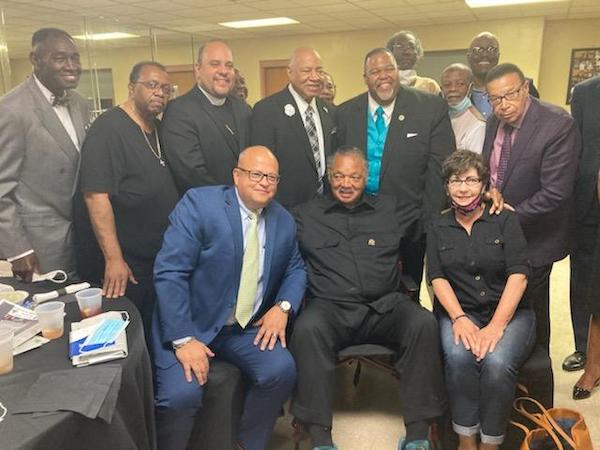A civil rights icon has thrown support behind the months-long claim by local activists that Sherwin-Williams has done little to include minority players in a construction project that exceeds a half-billion dollars.
The Rev. Jesse L. Jackson, whose signature passionate and poetic verbal cadence has given way to the debilitating effects of Parkinson’s disease, used a tranquil tone to deliver a familiar message of solidarity, inclusion, and community uplift. “I am absolutely supportive of this campaign,” stated Jackson at the July 13th gathering of assorted activists, clergy, government officials, and minority business owners at Glenville’s Greater Abyssinia Baptist Church. “We didn’t come to destroy. We’ve come to build. All sides must get back to the table to resolve this issue. It is in the best interest of Cleveland to meet with the SCLC (Southern Christian Leadership Conference).”
Vocal civil rights advocates, including SCLC national president Dr. Charles Steele and Cleveland Contractors Group president Norman K. Edwards, both of whom were in attendance, have held regular negotiations with Sherwin-Williams officials since construction activity began last autumn. But company officials inexplicably walked away from the negotiating table, according to Edwards, Rev. Dr. E. Theophilus Caviness, senior pastor at Greater Abysinnia and long-time community activist, and others.

Norm Edwards
“Sherwin-Williams, if you say you love the community, why do you treat me like you do? It must change. It’s got to change!” shouted Steele. Both Steele and Edwards claim Sherwin-Williams has historically provided only token minority business involvement. “They have not done enough,” Edwards said. “They continue to fail the black and minority community. They have only hired one black board member in one-hundred fifty-five years, and that was after we did our first protest.”
Ground broke last October 22 for the multinational company’s new research and development center in Brecksville. Three month later, another groundbreaking happened for its new headquarters in downtown Cleveland, according to the company’s website. Officials say plans to complete both projects by the end of 2024 remain on schedule despite what has become a growing rift around the issue of appropriate levels of minority business inclusion. The following “Company Statement” is found on Sherwin-Williams’ website in reference to its commitment to supporting minority-owned business:
“We are proud that we have already awarded contracts totaling $109 million against a total commitment of $180 million to Minority Business Enterprises (MBE), Female Business Enterprises (FBE) and Cleveland Small Businesses (CSB). We remain committed to helping uplift the entire Greater Cleveland Community…
Additionally, our process has resulted in more than 50 minority-owned and small business firms being added to our project, and we expect to expand.”
However, Edwards said the company’s statement lacks transparency. “They put a press release out saying that they have $108 million in (minority business) contracts. That’s so not true. Show the contracts so we can verify that; make it verifiable to the public. It’s business as usual and until we demand the changes and stop giving them our public dollars, they’re going to continue to do that.”
“Our inclusion should be more than 50% when you’re spending the taxpayers’ money,” said Rev. Jackson. “Sherwin-Williams shouldn’t run business just to be in business. We didn’t come to try to put Sherwin-Williams out of business. We came to partner with them. Together we must meet with Sherwin-Williams.”
Jackson also specified what true inclusion would entail from a business perspective. “Number one, we want our part of the five hundred shares of stock. Two, we want black and brown coalition, jobs, and contracts both horizontally and vertically.”
When asked if there are still enough contracts available given the number that have already been given to other firms, Jackson replied, “It’s never too late to do the right thing. Our leadership needs to meet with their leadership. Whatever happened to break (negotiations) down, let’s fix it.”
Jackson sees Sherwin-Williams’ alleged under-representation of minority contractors from a broader historical context. “I believe the issues that have happened with Sherwin-Williams are instructive, but they don’t have to be destructive. There are many construction companies that want access to capital. Cleveland will cease to be the poorest city when we get these contracts and future contracts. We stand in solidarity with anyone who wants to make that happen.”

Before taking his seat, Jackson invited Marsha Mockabee, president and CEO of the Urban League of Greater Cleveland, to clarify her organization’s role with respect to the Sherwin-Williams projects.
“There are hundreds of registered contractors in Northeast Ohio who don’t know how to submit a contract,” said Mockabee. “We are here to show them. That’s what we’re here to do, not to compete with anybody else. That is our role at the Urban League of Greater Cleveland.”
Jackson indicated he will continue to monitor and address Sherwin-Williams’ project activities in other cities, such as Atlanta, Chicago, and Miami.
• • •• • •













